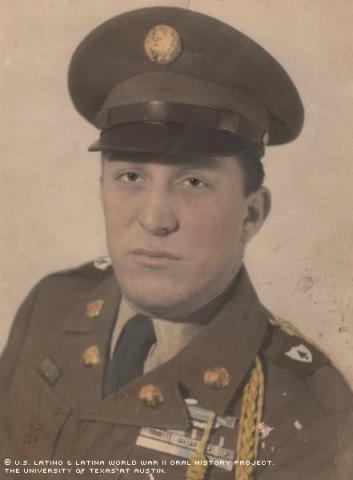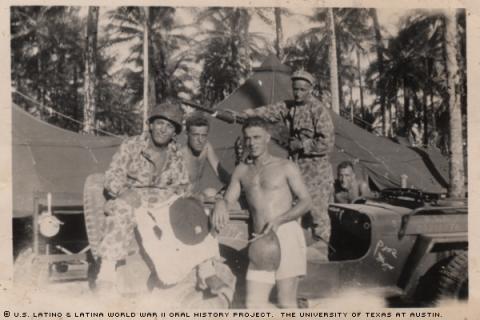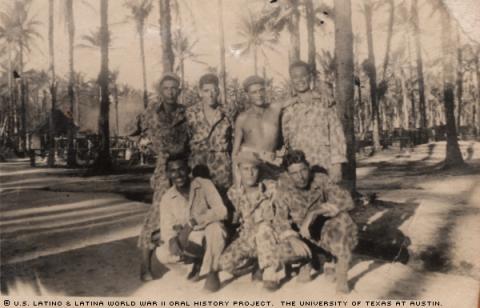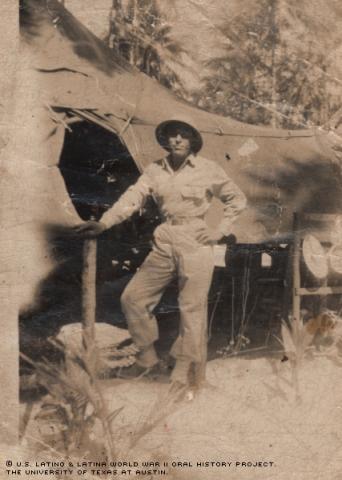



By BROOKE MEHARG
Juan Martinez smiled as he remembered receiving letters from proud siblings while he was stationed in the Philippines, telling him he was in their prayers.
"Thanks to God that their prayers went up to heaven," Martinez said.
Born in 1923, he grew up in La Gruya, Texas, between the cities of Mission and Rio Grande City, living with his grandmother until the age of 9 because of his parents' divorce. Unlike many families, his did not struggle economically by virtue of his father's successful bakery and Mexican food restaurant.
His education ended in the ninth grade, and he took jobs shining and repairing shoes. At 16, he was earning 50 cents a week.
Throughout his childhood, Martinez dreamed of becoming a soldier. He tried to enlist as a 16-year-old but was turned down because of his age. His dreams came true when he enlisted in 1940 at the age of 18.
He was originally sent to Brownsville, Texas, for basic training. But after Japan bombed Pearl Harbor on Dec. 7, 1941, he was sent to Fort Ringold in Rio Grande City, Texas, for additional training.
Aside from the rigors of training, Martinez faced economic hardships as a soldier, receiving only $19 a month to start, and $50 after turning 21. The same year of his eligibility for a pay raise, he also met his future wife, Marta Estena, at a dance hall in Mission, Texas, during a break in training. The two married in 1942 before he was sent overseas.
Martinez traveled to many places throughout his military career including, Australia, New Guinea, Manila, Philippines, Germany, Italy, Austria and Switzerland.
Fluent in Italian, he served as his troop's interpreter during a tour of Italy. "We went to demonstrations in Italy. I got the best soldier of the year (award) while I was there," he said, referring to a designation he earned for his efforts. As further reward, he was granted a furlough in Switzerland.
"They sent me to Austria for two weeks, everything was paid. The soldiers were given a special pass to go to town," Martinez said. "I used to drink and I liked the dances." On the same excursion the soldiers went to Switzerland.
In his company (1st Cavalry Division, 88 Infantry Division, 1st Infantry Division), there was a Native American from New Mexico who taught him how to ride horses and high-jump. "We went to a competition in Austria and won second place for horse riding."
In Germany, he saw places where Jews were exterminated. "It was just terrible there, you could smell the burning," Martinez said.
Martinez experienced discrimination from within his own ranks, from an Anglo soldier in his own squad. "He hated me and didn't want to take orders from me," Martinez said.
But that would soon change one day when the commanding officer ordered Martinez to take the men to a nearby body of water for aquatics training. Martinez said the young man who disliked him was close to drowning. "I saved him and got the water out of him and then he liked me very much after that," Martinez said.
Even though he won his fellow soldier over, discrimination was still rampant. Martinez said 75 percent of his cavalry were of Mexican ancestry. But he didn't want to be a part of the racial politics: "I always tried to be a good solider and stay out of trouble."
Martinez was promoted to the second squadron as his colonel's bodyguard, and rescued his commanding officer while crossing a body of water during a storm. As a raging torrent hit the Philippines, he was the first one to make it across the powerful currents saving his drowning colonel in the process. Once the officer was safe, Martinez tried to help others.
All the men knew Martinez's squad as the Tiger Squad. "We all liked to fight and didn't care. "We were . . . very brave and good in combat." Martinez said.
While fighting against the Japanese, Martinez took a bullet in the leg. Another bullet also hit his helmet, scratching both sides of it. "One part went one way and the other half went through the helmet," he said.
In Germany, he graduated from the Non-Commissioned Officers' Academy and soon after was able to come back home to the United States.
While returning to the United States, Martinez said he saw the deadly glow of the atomic bomb that would lead to the Japanese surrender. The war in Europe would end shortly after that, in May 1945.
Martinez now lives in El Paso, Texas, and is active in his church, which he has served as pastor for 30 years. After the war, he also worked as a supervisor for a janitorial service. Martinez and his wife have six children and numerous grandchildren and great grandchildren.
He offered his advice to a younger generation of Latinos: "Every time I get to talk to a young man or young lady, I tell them education is the best in the world in order to find a good job and to be a good husband. Without education you don't get anywhere."

